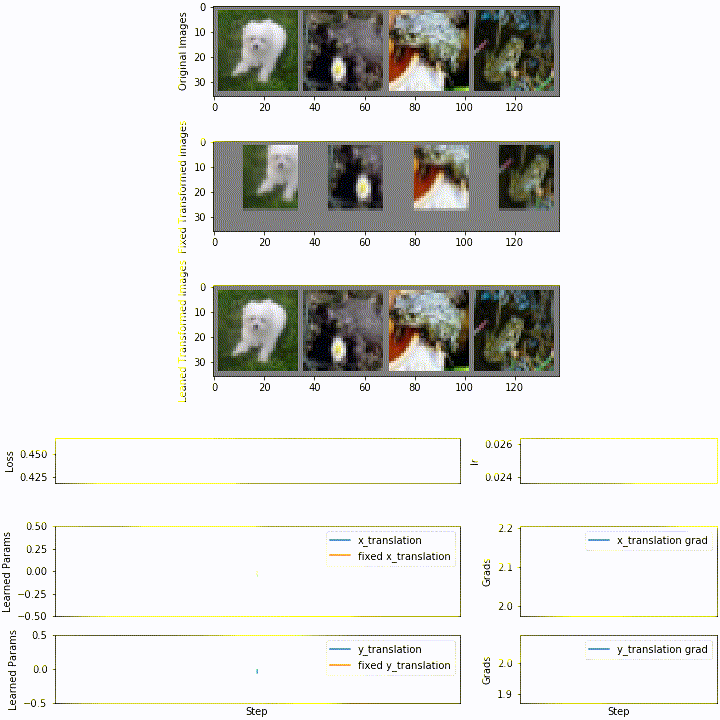Backpropagation through Translation
See original GitHub issueHi, Thank you for the wonderful package ! I have been trying to learn translation (x, y) parameters in the following manner:
`class DTranslation(nn.Module): def init(self, x_translation, y_translation): super(DTranslation, self).init() self.translations = torch.stack([x_translation, y_translation], 1) self.angle = torch.tensor([0])
def forward(self, input):
_, _, h, w = input.shape
if self.angle.shape[0] != input.shape[0]:
angle = self.angle.repeat(input.shape[0])
else:
angle = self.angle
if self.translations.shape[0] != input.shape[0]:
translations = self.translations.repeat([input.shape[0], 1])
else:
translations = self.translations
translations[:, 0] *= h
translations[:, 1] *= w
# define the rotation center
center = torch.ones(2)
center[..., 0] = input.shape[3] / 2 # x
center[..., 1] = input.shape[2] / 2 # y
center = center.repeat(input.shape[0], 1)
# define the scale factor
scale = torch.ones(input.shape[0])
# compute the transformation matrix
M = kornia.get_rotation_matrix2d(center, -angle, scale)
# Translate
M[..., 2] += translations # tx/ty
# apply the transformation to original image
out = kornia.warp_affine(input, M, dsize=(h, w))
return out
tx = torch.tensor([0.3], dtype=torch.float32) tx_p = Parameter(tx, requires_grad=True)
ty = torch.tensor([-0.2], dtype=torch.float32) ty_p = Parameter(ty, requires_grad=True)
translation = DTranslation(x_translation=tx_p, y_translation=ty_p)
criterion = nn.MSELoss() optimizer = optim.Adam([tx_p, ty_p], lr=1)
for x, y in dataloader: optimizer.zero_grad() loss = criterion(x, translation(x)) loss.backward() optimizer.step()`
The first backward call passes, but the second one fails:
RuntimeError: Trying to backward through the graph a second time, but the saved intermediate results have already been freed. Specify retain_graph=True when calling backward the first time.
When I follow the instructions and instead I use:
loss.backward(retain_graph=True)
I receive the following error:
RuntimeError: one of the variables needed for gradient computation has been modified by an inplace operation: [torch.FloatTensor [1]] is at version 1; expected version 0 instead. Hint: enable anomaly detection to find the operation that failed to compute its gradient, with torch.autograd.set_detect_anomaly(True).
I also tried to avoid the inplace operation:
M[..., 2] += translations
and use instead:
shape = list(M.shape) shape[-1] -= 1 M = M + torch.cat([torch.zeros(shape), translations.unsqueeze(-1)], 2)
but got the same errors.
Maybe another inplace operation causes this ? e.g. https://github.com/kornia/kornia/blob/5a736409a9a133da27c3dfa581bba2bc71f27286/kornia/geometry/conversions.py#L122
Or is it something else ?
It is worth mentioning that I do manage to backpropagated through rotation angle and shear (x, y) but only translation seems to be the problem, i.e. when I comment out
M[..., 2] += translations
No errors occur, but of course I cannot learn the translation parameters either.
Any thoughts ?
Issue Analytics
- State:
- Created 3 years ago
- Comments:11 (4 by maintainers)

 Top Related StackOverflow Question
Top Related StackOverflow Question
Hi @NivNayman, impressive gif you have made!
We are currently actively looking for tutorials/examples using Kornia, especially on those demonstrated differentiabilities in a world use cases. I think your example can be a very impressive one. Let me know if you are okay with making a jupyter notebook!
Wonderful ! It works now:
Indeed the only problem was placing
translations = torch.stack([self.x_translation, self.y_translation], 1)at the init() rather than in the forward().FYI all the inplace operations doesn’t interfere with the differentiation as those are all differentiable, i,e, both:
translations[:, 0] *= h translations[:, 1] *= wAnd:M[..., 2] += translationsClosing the issue.